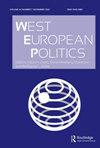包容性候选人选择与腐败:来自西班牙地区的证据
IF 3.6
1区 社会学
Q1 POLITICAL SCIENCE
引用次数: 1
摘要
选民的高腐败观念已被证明对政治参与,对机构的信任和解决集体行动问题的能力产生可怕的后果。对腐败的研究主要集中在宏观和微观两个层面来解释发达国家的持续腐败。本文添加了一个新的中观变量:政党初选。虽然直到最近,选择候选人还是少数政党精英的特权,但许多西欧政党已经引入初选来选择公职候选人。本研究认为,这种增加党内民主的尝试对腐败观念产生了负面影响,并提出了三种机制,通过这些机制,初选增加了使用初选的政党支持者的腐败观念。首先,初选可以被视为一种“粉饰门面”的手段,其次,初选可能会受到贿选的影响,第三,初选中的候选人有动机进行反精英主义竞选,以将自己与党内精英候选人区分开来,从而增加了腐败的显著性。这一理论论点是使用西班牙地区初选的新数据集和差异设计中的腐败观念进行测试的。研究结果支持了初选增加政党支持者对腐败的认知的假设,并暗示这一结果是由竞争性初选过程驱动的,而不是对竞争的限制。本文章由计算机程序翻译,如有差异,请以英文原文为准。
Inclusive candidate selection and corruption: evidence from Spanish regions
Abstract High corruption perceptions among voters have been shown to have dire consequences for political participation, trust in institutions and ability to solve collective action problems. Research on corruption focussed on macro- and micro-level explanations to explain persistent corruption in developed countries. This article adds a new meso-level variable to the picture: party primaries. While until recently selection of candidates was the privilege of narrow party elites, many Western European parties have introduced primaries to select candidates for public offices. This study posits that this attempt at increasing intraparty democracy has negative consequences regarding corruption perceptions and suggests three mechanisms through which primaries increase corruption perceptions among supporters of parties that use them. First, primaries can be perceived as a means of ‘window-dressing’, second, primaries can suffer from vote buying, and third, candidates in primaries have incentives to campaign on anti-elitism to distinguish themselves from party elite candidates, increasing corruption salience. The theoretical argument is tested using a novel dataset on primaries in Spanish regions and corruption perceptions in a difference-in-difference design. The results support the hypothesis that primaries increase corruption perceptions among supporters of parties that use them and hint that this result is driven by the process of competitive primaries rather than a restriction of competition.
求助全文
通过发布文献求助,成功后即可免费获取论文全文。
去求助
来源期刊

West European Politics
POLITICAL SCIENCE-
CiteScore
10.00
自引率
7.10%
发文量
58
期刊介绍:
West European Politics (WEP)has established itself as one of the most authoritative journals covering political and social issues in Western Europe. It has a substantial reviews section and coverage of all national elections in Western Europe. Its comprehensive scope, embracing all the major political and social developments in all West European countries, including the European Union, makes it essential reading for both political practitioners and academics.
 求助内容:
求助内容: 应助结果提醒方式:
应助结果提醒方式:


